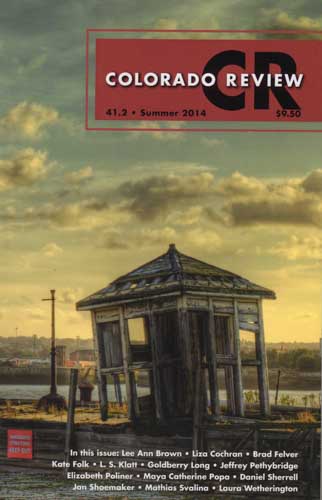Colorado Review – Summer 2014
The prose and the poetry in this issue of the Colorado Review are in two separate sections. And the issue certainly feels like two different journals, the prose accessible and filled with gripping stories, and the poems experimental and eclectic. The prose and the poetry in this issue of the Colorado Review are in two separate sections. And the issue certainly feels like two different journals, the prose accessible and filled with gripping stories, and the poems experimental and eclectic.
“Big Pin” is one of the best essays I have ever read, without qualification. It is even more astounding to learn from the contributors’ notes that this is Daniel Sherrell’s first publication and that he is a college student. “Big Pin” is about wrestling, but it is also about young men with limited options in central New Jersey, Sherrell’s evolution, race, class, and war. The essay is well-organized, ambitious, sensitive, and shows maturity in feeling, judgment, and the control of language. Every other line is an original and precise turn of phrase: “[i]nside, the air was sweat-heavy, almost sepulchral”; “he was an asshole, but, as is probably the case with most assholes, it wasn’t all his doing, and it’s very important to acknowledge this.” Every person who appears in the essay receives generous attention, but each takes up only as much time and space as the story requires. Discovering writing like this is a true pleasure, and I look forward to seeing much more from Sherrell.
Elizabeth Poliner’s story, “Sometime, Springtime,” is as lovely as its title. The story alternates between a playhouse on the Connecticut River and New York City, between Nell waiting for standby seating at the playhouse and blooming in a romance. It feels like a breeze over the river, simple, gentle, making you a little wistful when it is gone. In contrast, “How Sister Concepción Burned Down Nuestra Señora de Los Luceros Through No Fault of Her Own, Which Everyone Agrees”by Goldberry Long is filled with intense colors, like a sunset over the mesa. The contradictions within Sister Concepción, a nun in New Mexico at the turn of the twentieth century, eventually erupts literally and metaphorically into flames. Her voice modulates between thoughts and emotions of different pitches but never loses its essential timbre. Kate Folk paints a compelling picture of a teenager’s desire for a fugitive in “Tornado Season”: innocent, erotic, punishing.
Halfway into Liza Cochran’s “Natural Forces,”an essay on the environment and her family’s relationship to it, I almost wanted to stake out my own plot of land; not because Cochran described an idyll, but because of an appeal that came from honesty and vulnerability. Her parents seemed to have had the same discerning attitude: “I doubt that my parents considered their settling in the southern Vermont countryside to be a sacred act. Even if they felt twinges of sanctification, calling it such would have certainly felt too presumptuous. My parents believed in working outside and raising kids in clean air and garden dirt and pond water.”
The poems strike immediately with their willingness to experiment. They are single- and double-spaced, run in regular couplets and end-justified paragraphs, are printed in gray and true black on the same page, create emotional sense out of disparate pieces, and challenge the reader to put them together on her own. Aaron Kunin’s two poems use quotation marks in unexpected places to force pauses in reading and attention to the words that we may have glossed over in our natural reading rhythms. Jeffrey Pethybridge’s found poems look like they have been scattered to the four winds, with a block of several lines in the center and words and phrases floating around the block. The language suggests that these are meditations on war, and the break with traditional poetic patterns implies a variety of attitudes: despair, distance, resignation, or fury? The five “Wastoids” from Mathias Svalina’s forthcoming book, Wastoids, are strange and whimsical, and they leave readers with the sense that things are not going to end perfectly for the people and animals that appear in them: not dark, just a little off-kilter, and therefore surprisingly realistic.
In short, the Summer 2014 issue of the Colorado Review is well worth your while. The prose is phenomenal; the poems take more work, but they suggest infinite possibilities.
[coloradoreview.colostate.edu/colorado-review]




